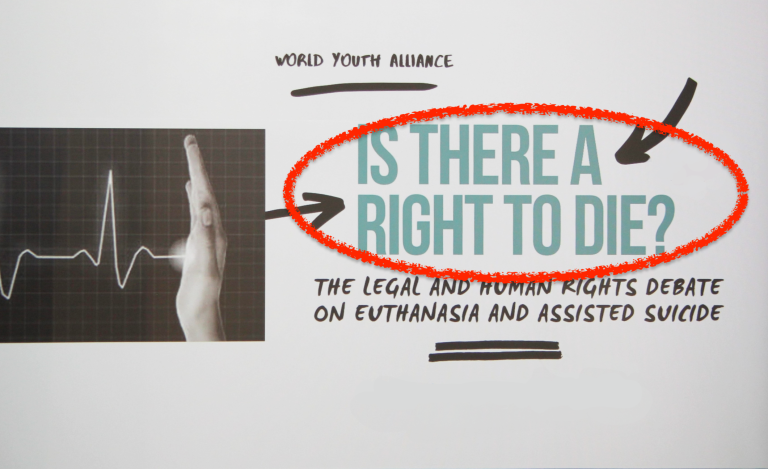Assisted Suicide: The latest in the US
What states is assisted suicide legal? As WYA recently reported, the State of New York is amongst the latest of legislative bodies moving towards the legalization of physician-assisted suicide, a menacing method of ending life. As of mid-May, the New York Senate Majority Leader, Andrea Stewart-Cousins, is intending to bring the bill to the floor. This comes after the legalization of physician-assisted suicide in Delaware, which would make New York one step closer to being the twelfth state to permit individuals to take their own lives as part of the “death with dignity” agenda. WYA seeks to bring to surface the threatening nature of these types of laws, and highlights how offensive they are to the dignity of the human person.
It is crucial to consider the background of the “Death with Dignity” campaign. Death with Dignity is a nonprofit organization which started in 1997. Its mission focuses on end-of-life advocacy, so that terminally ill individuals can “decide for themselves what a good death means.” Death with Dignity’s core values are listed as dignity, freedom and autonomy, trust, and financial stability. “We are responsible stewards of the resources entrusted to us by our donors in order to ensure the long-term viability of our organization.” Since when is money directly associated with a good death? Death with Dignity also lists its other organization, Death with Dignity Political Fund, showing that there is a whole political movement of so much importance that it deserves its own mention as part of its core “values.” The value of the human person is, notably, not listed under these “values.”
The Impact of Assisted Suicide on Vulnerable Populations
Further, as WYA reported regarding the assisted suicide bill in the UK, certain populations feel like these types of bills almost encourage their assisted suicide since they begin to feel more and more like burdens on their caretakers. This is especially so considering the public support reported in the news around this legislation, explicitly speaking of the “need” for such bills for the elderly and handicapped. Remarkably, in Oregon, where physician-assisted suicide has been legal since 1997, the data shows staggering statistics to support this. In fact, the Oregon Health Authority has published an annual report citing the main reasons individuals choose assisted suicide. Being a burden on family and friends/caregivers accounts for a massive percentage, which is only growing. In the first five years of the bill, about one-third of individuals choosing assisted suicide were concerned about being a burden, and since 2017, this percentage has increased to around 46% of people desiring their deaths as a way to alleviate such “burden.”
Further, the New York Association on Independent Living said that the bill “threatens the lives and civil rights of people with disabilities under the guise of compassion.” What is even more concerning is what this type of law could mean for the disabled community. One individual recently wrote about how the New York assisted suicide bill directly targets people like him who have disabilities, psychologically enforcing the idea that their lives are not worth living, contributing to a “throwaway culture” where any number of trials of life become synonymous with a life of diminished value.
Explaining that he has experienced a lifetime of “staring into the suicidal abyss,” the author discusses how he is grateful to have such a supportive, loving family, but with an increase in suicidal ideation across the board, assisted suicide becomes an out for those who are mentally struggling and who do not have such critical support systems. Legislation that opens the door to these opportunities to end it all, he furthers, cheapens the lives of the most vulnerable by not allowing them the chance to live a full and familial life.
WYA’s Voice Was Heard
In contacting the New York State Senate to express concern over the lack of safeguards in the Senate bill, WYA staff was informed that there is “a lot of protection for vulnerable communities baked in [to the bill] so it won’t cause people with disabilities or other communities to be forced to do anything.” Individuals struggling with mental health need guidance and support, and this bill is not offering that.
WYA staff were also “assured” that this bill is special. This bill is different “because in New York individuals have to administer the drugs for themselves instead of physicians doing so.” As the bill states, “a healthcare professional or other person shall not administer the medication to the patient.” This is seen as an additional layer of “autonomy,” whereby individuals can obtain the lethal medication but ultimately choose not to ingest it.
Even if one chooses to not ingest the medication, however, knowing that it exists in one’s medicine cabinet is a lasting and easily accessible temptation, not to mention a danger if it gets into the wrong hands. News Medical Life Sciences even reports that researchers have a concerning lack of data on those who wound up not taking the medication; there is a major gap in understanding how those individuals were advised and counseled in the first place. Clearly, this is not sound evidence, and it is extremely threatening for vulnerable populations to have access to this type of procedure without proper safeguards. Finally, WYA staff were told specifically that advocacy groups, like Death with Dignity, are not directly behind the bill because it is “merely legislation.” This is a shameless lie, as the bill itself has used language—”dying with dignity”—straight from the group.
Should the New York Assembly pass the Medical Aid in Dying Act, the next step in the procedure is for the Senate to formally vote on it. It is expected that the current bill will pass, given that lobbyists have been putting pressure on the State’s senators. The time is now for combating the perilous arguments embedded in such legislation.
What Comes Next for Assisted Suicide?
Furthermore, as many have pointed out, legalizing assisted suicide is a political move that is prone to abuse. For example, after decades of assisted suicide becoming legalized in the country, the Netherlands now permits euthanasia for children from the time they are a mere one-years-old. This shows that the prospects of legislation that permit any form of taking of innocent life can become so eroded over the years that the most innocent in our society may have no chance at life at all.
WYA actively seeks to bring attention to these types of dangerous, legislative tactics that are buried in altruistic-sounding language and ensure that leaders and citizens wake up to the reality that assisted suicide laws do not promote human dignity.
As the research in the World Youth Alliance White Paper on Euthanasia makes clear:
Within human rights law, “dignity” has a precise meaning: the value an individual human being has simply by virtue of being human. This value is intrinsic, inherent, and universal. It does not decrease or increase in proportion to any personal characteristic, experience, or action. That includes manners of dying; no one loses his dignity because he has become reliant on others for care, or experiences suffering. To suggest otherwise suggests that human life does not have objective value, which would undermine not only laws banning assisted suicide, but the foundation of human rights itself.




